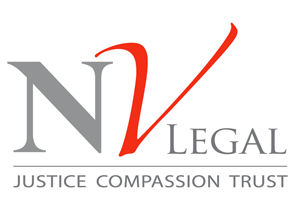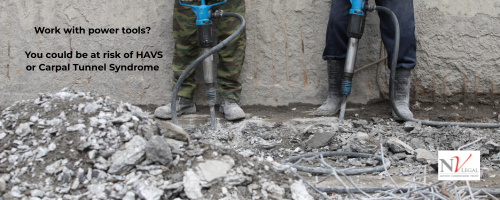Could your job be harming your hands?
If you’ve spent years working with power tools or vibrating machinery and have started to notice tingling fingers, numbness, or discomfort in your hands and arms, you may be suffering from Hand-Arm Vibration Syndrome (HAVS).
Hand-Arm Vibration Syndrome (HAVS) and vibration-induced carpal tunnel syndrome are surprisingly common and often preventable. These conditions can significantly impact daily life, from making simple tasks difficult to ending a career in manual work altogether.
Around five million UK workers have been exposed to vibration risks and approximately 750,000 are symptomatic with many unreported or undiagnosed.
We help clients with vibration-related injuries and will explain these conditions, how they happen, and how we can support you if your symptoms are linked to poor workplace safety.
What is HAVS?
Hand-Arm Vibration Syndrome is a permanent health condition caused by prolonged use of vibrating tools or machinery. It affects the nerves, blood vessels, and muscles of the hand and arm. Those most at risk are people working in sectors such as construction, engineering, utilities, shipbuilding, and manufacturing, anywhere using power tools like drills, grinders, chainsaws, or sanders regularly.
HAVS develops gradually. At first, it might just be a mild tingling or slight discomfort in the fingers. But over time, it can progress to include numbness, a loss of grip strength, and painful flare-ups triggered by cold or damp conditions. One hallmark sign is called ‘vibration white finger’, where fingers temporarily lose colour and feel numb or painful before returning to normal.
Symptoms and diagnosis
People with HAVS often notice two sets of symptoms. Vascular symptoms include the fingers’ episodic blanching (turning white), usually when exposed to the cold, followed by redness and pain as blood returns. These attacks may last 30–60 minutes and worsen over time. The sensorineural side of HAVS involves tingling, numbness, and a loss of fine touch, making it harder to grip, button clothes, or use tools with precision.
In many cases, the symptoms become permanent. Unfortunately, there’s no single test for HAVS, so diagnosis relies heavily on a detailed occupational history, clinical assessment, and often, photographic evidence or statements from colleagues and family members. The Stockholm Workshop Scale is typically used to assess severity, and the Judicial College Guidelines provide guidance as the level of compensation a person is eligible to receive depending on the diagnosis and prognosis.
Carpal Tunnel Syndrome and vibration exposure
Compression of the median nerve in the wrist causes Carpal tunnel syndrome (CTS). Although it’s a different condition from HAVS, the two often overlap. CTS typically causes numbness, tingling, and weakness in the thumb, index, and middle fingers, sometimes making it difficult to hold objects or perform detailed hand movements.
Vibration-induced CTS is recognised under industrial disease frameworks, but is not always straightforward. Some experts argue that other factors, such as genetics, diabetes, obesity, or wrist anatomy, may also contribute. However, in cases where the symptoms clearly follow long-term use of vibrating tools, it’s possible to establish a strong link and pursue a legal claim.
Could your job be to blame?
If you’ve worked with vibrating tools for long hours over several years and now experience any of the symptoms described, there’s a good chance your job may be the cause. Many workers aren’t warned of the risks or given the proper protection. Employers should have policies to limit exposure, but this often doesn’t happen, especially in smaller firms or casual work environments.
You don’t need to use tools every day to be affected. Even intermittent use, if sustained over a long period, can lead to injury. For many of our clients, the true extent of the damage becomes clear only after leaving a role or changing jobs.
What should employers do? Under the Control of Vibration at Work Regulations 2005, employers in the UK are legally required to take vibration exposure seriously. These laws set out clear responsibilities, including risk assessments for all relevant job roles, efforts to reduce exposure as far as reasonably practicable, and proper training on using tools safely. Regular health surveillance should also be in place to catch symptoms early.
Sadly, we often find that employers either haven’t followed these regulations or kept up with best practices. Where there’s a failure to assess risk properly, monitor tool use, or act when symptoms arise, there may be grounds for a compensation claim.
How compensation can help
Living with HAVS or CTS can have serious financial consequences. You might have to give up a job you’ve done for years, retrain for something new, or even stop working altogether. That’s why compensation claims aren’t just about recognition, they’re about providing financial support when needed most.
Compensation can cover general damages for the pain and suffering caused by the condition, as well as loss of past and future earnings, pension losses, care or medical
costs, and even the cost of retraining for a different job. Because HAVS is classed a divisible disease, multiple employers may share responsibility if you were exposed over several roles. That means you don’t need to rely on a single employer admitting fault we can help establish who should be held accountable and how much each should pay.
How NV Legal can support you
We have significant experience dealing with vibration-related injury claims. From your first call with us, you’ll speak directly to a qualified solicitor, not a call handler or admin assistant.
We can arrange medical assessments to confirm your diagnosis, collect detailed evidence about your work and exposure history, and, where necessary, bring in experts to assess the levels of vibration involved. We also help you collect statements from co-workers and family members to support your case. Our team will liaise with former employers and insurers on your behalf, and we won’t give up until you get the compensation you deserve.
Too many people live with the symptoms of HAVS or carpal tunnel syndrome without realising their condition is work-related. Others are told it’s just part of getting older, or something they must live with. That’s not true.
If you’ve developed symptoms and believe your job may be the cause, contact NV Legal today. We offer free, no-obligation advice and can quickly tell you whether you have a claim. We’ll listen to your experience, explain your options clearly, and offer support throughout the process.
Your hands are one of your most essential tools – protect them. If your employer didn’t, we’re here to help.
About NV Legal
We pride ourselves on our personal, hands-on approach. When you work with us, you won’t be passed between departments or left chasing updates. You’ll deal directly with one of our experienced solicitors, who will manage your claim and recovery pathway from start to finish.
If you’ve suffered an accident and need support, get in touch for a free, no-obligation chat. It’s not just about the claim, it’s about helping you recover.
Contact NV Legal
Call – 03330 112 732
Email – info@nvlegal.co.uk
Website – nvlegal.co.uk


